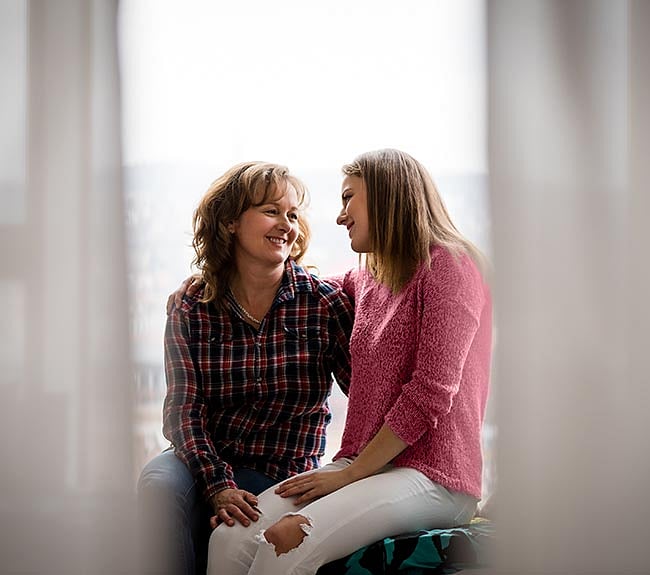
How you and your daughter can #GiveAbuseTheBoot
Moms are the people we go to for advice, a pillar of support and a source of infinite love. But they are also human, susceptible to heartbreak, pain and disappointment. And very often these are things they feel on behalf of their children. Nothing is more heart-breaking then seeing your child remaining in a situation that is unhealthy or harmful to them. Many moms witness this with daughters stuck in a cycle of abuse with a violent partner, leaving them feeling completely helpless. You aren’t. The fact that you know she is in an abusive situation, means you are already in a position to help her. If you suspect she is being abused and want to confirm this suspicion, here are some signs to look out for.
Some signs your daughter is in an abusive relationship
- Lashing out or becoming withdrawn – if you ask if everything is okay, she often reacts defensively and closes up.
- Acts with extreme vigilance – she watches everything she says and does around her partner.
- Excuses their behaviour – she minimises the abuse, often blaming herself– ‘he’s just very stressed’, ‘I shouldn’t have made him angry’, etc. Remind her that any type of abuse, in any shape or form, is unacceptable.
- Is non-challenging – never asserts herself or contradicts anything her partner says.
- Develops physical symptoms – this includes depression, increased fatigue and high levels of anxiety.
- Develops psychological symptoms – has extremely low self-esteem and constantly feels inadequate and unworthy.
Practical advice for taking action
Once she has opened up and realised the severity of her situation, you can start planning for her escape. From a practical perspective, leaving an abusive partner can be extremely difficult. There are however helpful steps, you can advise her to follow, which could make her departure easier:
Step 1: Preparing to leave
If she is in imminent danger, there is no time to plan. In that situation she should call the police or 10111 immediately. If she cannot get to the phone, she should scream as loud as possible, break things or set off the alarm, anything to get the attention of neighbours and passers-by. If she has time to prepare to leave, here’s what she can do:
- Seek organisations that can help – she can visit www.for-women.co.za, an online platform that brings organisations fighting women abuse together in one place. Here she can get the help she needs, from the closest place possible, which can offer the advice, security and/or support she needs.
- Source a safe house – you both may feel that she won’t be safe staying with you or another family member or friend. In this case, a shelter is the ideal place for her (and her children) to receive the security and support needed. Since addresses of safe houses are not openly publicised, for the safety of its residents, she’ll need to call a relevant hotline or visit www.for-women.co.za to find a safe house in the area. Make sure she uses your cell phone or computer to look for information and make calls in case her partner is monitoring her phone and internet history.
- Memorise emergency numbers – these are extremely important especially if she’s in a situation where she is facing imminent threat. These numbers include the Gender-Based Violence Hotline (0800 428 428) or the Tears SMS line (*134*7355#).
- Organise emergency funds – financial abuse is a prominent form of abuse and the reason many women feel trapped in an abusive situation. If you’re not in a financial position to support her until she is back on her feet, she’ll need to be creative in saving for an emergency fund. Some ideas are holding onto any change she can, hiding money given to her as a gift or getting a credit card in her name. She’ll need to ensure that statements are sent to her work address or your email address, so her partner won’t see them, and she should avoid accessing online banking from her own phone or home computer.
- Save evidence of abuse – this includes pictures of injuries, clothing with blood on it and any hospital documents that point to abuse. Whenever she is injured she must visit a doctor or hospital as these records could be crucial in receiving things like protection orders and custody of children.
- Have a getaway bag packed and hidden – pack a bag with all her personal necessities, and copies of important documents, for her and her kids, and make sure to hide the bag to ensure her partner won’t find it.
- Prepare the kids too – if your daughter has children, here are some safety planning tips for kids that may help give her some added peace of mind.
Step 2: How to actually leave
- Choose an escape window and destination – she’ll need to choose a time when she knows her abuser will be away from home, based on their usual schedule. If she doesn’t have her own transport, she’ll need to call you to pick her up or arrange someone to do so. If you’ve found a safe place for her to go, she’ll need the address memorised to get their quickly and easily. If she is coming to your home or to that of another family member or friend, you should all prepare to expect her at any time or give her a key to your premises so she get in quickly. Even if she feels safe at someone’s home, she should still contact a support organisation, like those listed on For-Women to get legal help and counselling.
- Leave her cell phone behind – in case her abuser has set up tracking on her phone, she should leave this device behind. If you can source her a cheap or second-hand phone that she could use as an alternative that would be ideal as she can use this to save emergency contacts, make calls and send messages.
Step 3: What to do after she’s left
- Seek legal advice – organisations like Lawyers Against Abuse provide free legal services and psychosocial support to victims of gender-based violence. She can connect with them at www.for-women.co.za.
- Apply for a protection order – help her do this by printing out this Application for Protection Order form which she can take to the nearest police station.
Whilst 1st for Women is working towards preventing women abuse from happening, these are helpful steps that you and your daughter can follow in the meantime. You can also reach out to a growing network of organisations fighting women abuse at www.for-women.co.za and get help or give help today.
The information in this article is provided for information purposes only and does not constitute professional advice.

We Have Great
Insurance Products
At 1st for Women we know that each
woman is an individual who has
different needs.
More Content
Most popular

Insurance
How to Submit an Insurance Claim with First for Women?

Insurance
Your Car Insurance Claim Can Be Rejected if You Do These 10 Things
Latest posts
Related Posts



